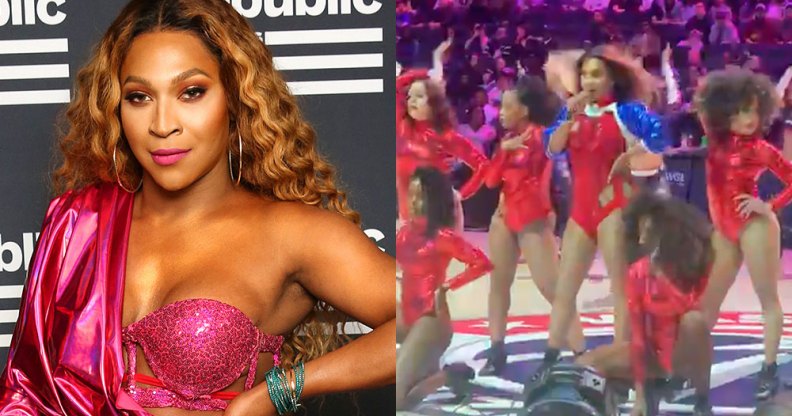This Beyoncé impersonator makes herstory as the first trans woman to perform at an NBA half time show

Riley Knoxx brought her Beyoncé illusion to the NBA. (Getty/Washington Wizards Facebook)
Riley Knoxx brought her Beyoncé illusion to the NBA. (Getty/Washington Wizards Facebook)
Riley Knoxx made trans history as she performed a three-song Beyoncé medley during an NBA half time.
Knoxx, known as the world’s number one Beyoncé impersonator, took centre stage during the Washington Wizards’ annual Pride Night game against the Atlanta Hawks to perform “Formation”, “End of Time” and “Crazy in Love”.
“One of the best nights of my entire life and career,” Knoxx wrote on Instagram.
“I’m so happy to I’ve had the opportunity to be the first transgender woman to ever perform at a NBA halftime.”
Speaking to Good Morning America, the performer revealed that the Wizards “reached out to [her], believe it or not”.
“They have been watching for a while and they’ve been wanting me to perform at their events, but they were just waiting for the right time and space,” she said.
Knoxx was joined by six dancers for the performance, which saw her recreate Beyoncé’s notoriously demanding choreography without missing a beat.
She said that the experience surpassed “anything [she] could have dreamed of”.
“People always ask me, ‘How does it feel to be living your dreams?’ or ‘Did you dream of this?’
“I’m always like, ‘No!’ I couldn’t have dreamed this. I’m living beyond anything I could have dreamed of.”
Riley Knoxx was in Taylor Swift’s ‘You Need To Calm Down’.
Last year, Knoxx was one of the many queer performers to star in Taylor Swift’s “You Need To Calm Down” video.
She called the star “one of the most gracious, most kind people I’ve met in my life”, telling Washington City Paper that Swift had hand-picked her after watching her performances and reading articles about her life as a Black trans woman.
“I was like, ‘You know my story?’ and she was like, ‘Of course, I picked you,'” she recalled.
In the same interview Knoxx defended Swift against allegations of cultural appropriation.
“You know, [she previously] said nothing, and [the critics] complained that she wasn’t being political enough.
“Now she’s saying something, and it’s ‘appropriating culture?’ How? She’s trying to help.
“You don’t have to be gay to have the voice to help people, you’re an ally. She wants to be an ally, let her be an ally.”

